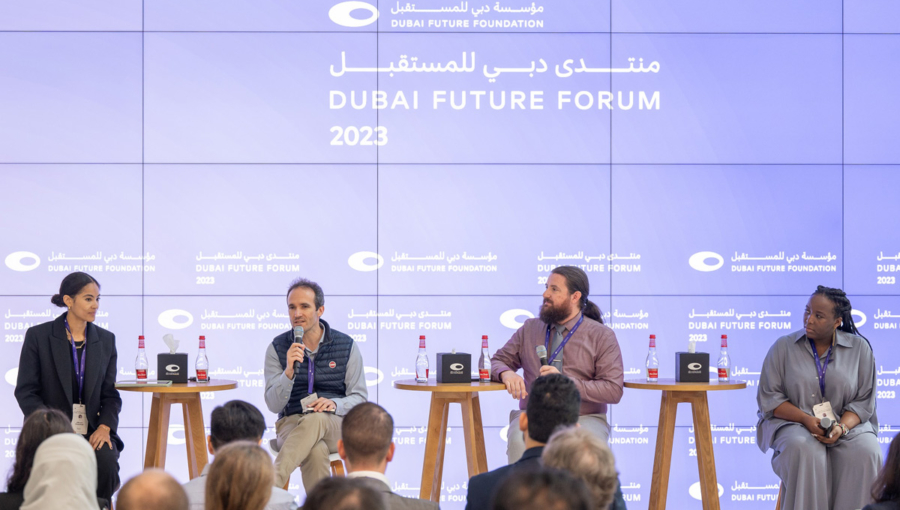The Dubai Future Forum, the world’s largest gathering of futurists organised by the Dubai Future Foundation and taking place on 27-28 November at the Museum of the Future, heard today that humans could soon be able to live on the Moon, perhaps as early as 2050.
Discussing rapid progress in space exploration and technologies, George Weinmann, Senior Director at Jeff Bezos’ space company Blue Origin, suggested humans can expect to land – and even live – on the Moon in 30 years.
Blue Origin’s Blue Moon lander is set to take astronauts to the Moon’s surface in 2029. Space agencies around the world are already exploring the potential of lunar bases for long-term stays on the Moon.
In the session, titled ‘Pack Your Bags for 2071: How Will We Travel?’, Dr Grzegorz Ombach from Airbus also highlighted the need for incremental progress in aviation – including in wings, materials and propulsion systems – over the next 20 years to achieve sustainability. He underlined the need to transform infrastructure, as well as aircrafts.
Jenny Southan from Globetrender anticipated travel in the future will cater to both consumer brackets, those who want to go faster and those who want to go slower.
Another session that took place under the theme of Transcending Collaboration – one of four themes at the Dubai Future Forum – was ‘Twinning for Health: Will A Digital Copy of You Unlock the Potential of Personalised Medicine?’
Drawing on his experiences at the Mohammed bin Rashid Al Maktoum Global Initiatives (MBRGI), Dr Abdulkareem Alolama called for equitable healthcare. He noted that the future is “bright”, as technology will unlock more accurate diagnoses and personalised treatment regimens.
Dr. Roger Highfield from the Science Museum Group presented how doctors currently look to the past for answers to the present. He said digital twins could change how healthcare works by creating a replica of the body, opening the door to personalised medicine. He said that we are “at the dawn of truly personalised and predictive medicine”.
Disability inclusion consultant, Jessica Smith, called for an honest discussion about diversity, while Dr Oskar Mencer from ‘Maxeler Technologies’ highlighted the benefit of recreating the medical history of people in a digital twin.
Another session under the theme of Transcending Collaboration was ‘Is Technology the Master or Multiplier of Human Creativity?’
Dr Jose Berengueres from the UAE University noted how AI can serve as a multiplier when used “properly and accurately”. Jason Allen from Art Incarnate, presenting on stage with a set of smart glasses, claimed he does not consider himself an artist, rather an art creator. The difference, he noted, lies in using AI as a tool to develop art that he has envisioned, much like an artist uses a brush to paint, or a pencil to sketch. Irene Mwendwa from Policy emphasised the need for inclusive AI in the future – to develop locally-relevant large language models, such as Jais AI Platform.
During a session titled ‘Human in the Loop: How Can We Foster Ethical Algorithmic Decision-making Processes?’, Dr Martin Muller from ‘Geneva Science & Diplomacy Anticipator’ called on governments to implement appropriate regulations around AI quickly. Emma Thwaites from Open Data Institute highlighted the need for data literacy to ensure ethical practices. She noted that education systems should teach about technologies that can boost intelligence and raise awareness.
Melanie Subin from Future Today Institute said that to ensure that the world is creating ethical and transparent algorithmic decision-making systems, we must have input from multiple stakeholders affected by these systems. She highlighted how these systems will ultimately inform many of the decisions that govern our lives and impact these same stakeholders.
